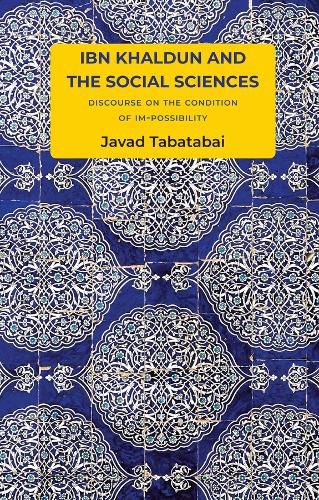Readings Newsletter
Become a Readings Member to make your shopping experience even easier.
Sign in or sign up for free!
You’re not far away from qualifying for FREE standard shipping within Australia
You’ve qualified for FREE standard shipping within Australia
The cart is loading…






Arabic and European studies of Ibn Khaldun, the great medieval polymath, follow one of two paths. In one direction, scholars interpret his Muqaddimah ('Prolegomenon'), written in 1377, as the point at which the new social sciences emerged. They identify Ibn Khaldun's 'new science of culture' as sociology or as an 'Islamic' alternative to sociology. In the other direction, the interpretation of Khaldunian discourse is confined to the Islamic-Aristotelian paradigm of its time. The epistemological novelty of the Muqaddimah is dismissed and the science of culture is perceived as a minor contribution to the Aristotelian curriculum.
Charting a different path, Javad Tabatabai's highly original book is an enquiry into the condition of the im-possibility of the social sciences in the Islamic-Aristotelian paradigm. It theorizes the condition of im-possibility of the 'scientific revolution' as the 'epistemic obstacle' to modernity in Islamic civilization. This theorization revisits Michel Foucault's discussion of the condition of possibility of the human sciences in light of the history of Christian-Aristotelian thought and the broader French debates about epistemology from Bachelard to Althusser.
Javad Tabatabai offers a critical theory of tradition and modernity in the Middle East, elaborating on a historical situation where social and human sciences emerged by way of colonial and post-colonial translations of discourse from Europe, and in a historical and epistemological break with inherited traditions of knowledge. In this situation, Tabatabai highlights the significance of reactivating Ibn Khaldun's critical reckoning with the limit of inherited traditions as the political-theological horizon of renewal.
$9.00 standard shipping within Australia
FREE standard shipping within Australia for orders over $100.00
Express & International shipping calculated at checkout
Arabic and European studies of Ibn Khaldun, the great medieval polymath, follow one of two paths. In one direction, scholars interpret his Muqaddimah ('Prolegomenon'), written in 1377, as the point at which the new social sciences emerged. They identify Ibn Khaldun's 'new science of culture' as sociology or as an 'Islamic' alternative to sociology. In the other direction, the interpretation of Khaldunian discourse is confined to the Islamic-Aristotelian paradigm of its time. The epistemological novelty of the Muqaddimah is dismissed and the science of culture is perceived as a minor contribution to the Aristotelian curriculum.
Charting a different path, Javad Tabatabai's highly original book is an enquiry into the condition of the im-possibility of the social sciences in the Islamic-Aristotelian paradigm. It theorizes the condition of im-possibility of the 'scientific revolution' as the 'epistemic obstacle' to modernity in Islamic civilization. This theorization revisits Michel Foucault's discussion of the condition of possibility of the human sciences in light of the history of Christian-Aristotelian thought and the broader French debates about epistemology from Bachelard to Althusser.
Javad Tabatabai offers a critical theory of tradition and modernity in the Middle East, elaborating on a historical situation where social and human sciences emerged by way of colonial and post-colonial translations of discourse from Europe, and in a historical and epistemological break with inherited traditions of knowledge. In this situation, Tabatabai highlights the significance of reactivating Ibn Khaldun's critical reckoning with the limit of inherited traditions as the political-theological horizon of renewal.